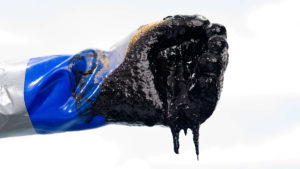Coronavirus is why oil prices are crashing

Pic: Vertigo3d / E+ via Getty Images
Coronavirus is behind the slump in oil prices over the last month, as Chinese demand collapses and hedge funds sell that news.
Oil demand in China has fallen by 20 per cent or about 3 million barrels a day, according to data from Bloomberg.
Escalating the price slump are hedge fund traders, who sold off futures and options last week equivalent to 147 million barrels on fears of a coronavirus-led slowdown in Chinese oil demand, according to data from Reuters.
Reuters analyst John Kemp wrote yesterday that oil traders were expecting a short-term oil consumption hit, due to the coronavirus lockdown and as many businesses extended the lunar new year holiday to stop people coming back to work thus preventing further spread of the virus.
Brent, the North Sea oil benchmark price, slumped 23 per cent from a peak in early January to $US54.25 ($81.07) overnight.
West Texas Intermediate (WTI), the US oil benchmark price, slid 22 per cent since its January peak to $US50.
This is important for the ASX’s Australia-based oil producers, such as Triangle Energy (ASX:TEG) and Buru (ASX:BRU), and even the odd US-based ones like Otto Energy (ASX:OEL), which sell their oil under Brent pricing.
Oil cartel OPEC is now considering an emergency meeting to decide how to contain the price slump.
It succeeded in raising prices after the last price crash in 2014 by members committing to slash production, but there are questions over whether it will have the same impact now given demand is becoming concentrated in the hands of virus-hit China.
READ: Here’s why OPEC’s cuts won’t affect oil prices in 2020; but here’s what will
The new mover and shaker
China has become the primary price mover for global oil.
It surpassed the US as the world’s largest oil importer in 2016, using 14 million barrels of oil per day (bopd) or the equivalent used by France, Germany, Italy, Spain, the UK, Japan and South Korea.
And last year, the Asian behemoth launched two massive new refineries and continues to issue new refinery licences.
The 400,000 bopd Hengli refinery started in Liaoning province and the 200,000 bopd Zhejiang Petrochemical refinery started in Zhejiang province.
Late last year the Oxford Energy Institute noted that an oversupply of gasoline might be possible, given those plants were producing more than needed in China last year.
Bloomberg data shows the country is now stockpiling gasoline as the country comes to a transport standstill, while in coronavirus lockdown.
NOW READ: Oil stocks guide: Here’s everything you need to know
Related Topics

UNLOCK INSIGHTS
Discover the untold stories of emerging ASX stocks.
Daily news and expert analysis, it's free to subscribe.
By proceeding, you confirm you understand that we handle personal information in accordance with our Privacy Policy.








